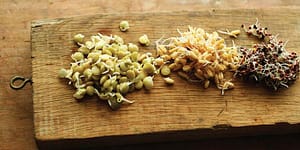The Revolution in Performance

In the past decade, there’s been more time and research dedicated to understanding athlete’s health and working to implement safety measures to ensure their well being on and off the field. Accomplishing any athletic goal is more work than just working out and eating right. No longer can we look at sports and nutrition apart. No longer can we think that stress and mindset are separate from performance. Sleep matters. The food you eat during halftime matters. It all matters.
The following is an excerpt from Peak by Marc Bubbs. It has been adapted for the web.
It takes a long time to be elite.
It’s planned, periodized, and purposeful. You need to show up every day and put in the work. Inspiration and motivation are great to get started on your journey, but they will fizzle out long before you make it to the finish line. I’ve seen it time and time again in the athletes I work with, as well as when observing the best of the best practitioners, PhDs, and coaches up close from the sidelines. Observation and environment are powerful learning tools. This book is about connecting you with world-leading experts and the research, the insights, and the methods they use (and perhaps more important, don’t use) to help athletes achieve world-class success.
Unfortunately, you can’t be an expert in everything.
There is too much information out there about nutrition, training, recovery, health, and cognitive function. You’ll never be able to read it all. As the old saying goes: “Jack of all trades; master of none.” But does this really have to be true, particularly as it relates to complex problems like upgrading athletic performance or reversing chronic disease? Complexity comes from interactions. Professor Sidney Dekker, PhD, an expert in complexity and systems thinking, says, “You cannot reduce a complex system to one of its parts, because if you do, you will tragically and dramatically oversimplify things.” By taking a certain perspective, you obscure some things and make others highly visible. The outcome of a system is never produced by one single part; rather, the outcome is produced via the interactions of all the parts. In this book you’ll find it is the interrelation of disciplines that unlocks our true potential. No longer can we look at sports and nutrition apart. No longer can we think that stress and mindset are separate from performance. Sleep matters. The food you eat during halftime matters. It all matters.
The Revolution in Peak Performance
A revolution is defined as “a dramatic and wide-reaching change in conditions, attitudes, or operation.” In high performance, the revolution is a reemphasis on the evidence-based fundamentals as a foundation. The revolution is an attitude toward individualized athlete health, nutrition, training, recovery, and psychology. The revolution is not only technology driving innovation and operation in sport, but the people analyzing and interpreting the data. Kevin Hartman of Google highlights this importance best, stating: “Invest 10 percent of your budget in technology and 90 percent in analysis.” It’s not just Big Data, but the value of the coach’s eye and knowing when to trust your instincts when faced with complex problems.
This book is just the tip of the iceberg.
Entire textbooks are written about each individual chapter in this book, so it would be impossible to give you all the information out there. You can pursue deeper learning in any of the areas through the work of the subject matter experts noted in this book, and via the 600-plus references listed. My goal is to connect you to the leading experts, sport scientists, and coaches out there, so you can learn the key fundamentals of their success and apply them in your practice. You get the insights directly from the performance professionals who spend lifetimes in the trenches working with high-performers. They rarely have 100,000 followers on Instagram, but they are truly blazing the trails and making a difference.

The Mediterranean dietary strategy is a great example—people in Mediterranean countries such as Spain, France, and Italy spend a paltry 20.3, 14.2, and 13.4 percent of household income respectively on processed foods. Comparably, individuals in the United States, United Kingdom, and Canada spend more than 50 percent of household income on processed foods. Not surprisingly, the former have some of the lowest incidences of chronic disease, while the latter struggle mightily.
That said, performance nutrition is different than nutrition for health, even though optimal health is crucial for performance. The difference is that performance nutrition is about winning. An athlete might need to include more processed foods to achieve their required energy intake during training, two-a-days, or when trying to make weight. An athlete might need supplementation, nutrient timing, and specific fueling strategies (that might appear at first glance extreme or even unhealthy) to get them over the hump. This is not to say they should be ignoring a Food First nutritional strategy, but simply that in high performance sports, certain strategies need to be implemented in order to compete at an elite level. In these pages you’ll learn the big rocks: the total caloric intake for athletes to target; the amounts or “grams per day” of proteins, fats, and carbs; and the therapeutic dose of a supplement. It’s up to you as the athlete or sports professional to round out the diet and select a quality supplement. (Check out my website DrBubbs.com if you’d like more support, or stay tuned for my next book).
The Next Greatest Gains
The success of expert-generalists throughout history is impressive. Albert Einstein was trained in physics, but to formulate his law of general relativity he taught himself an area of mathematics far removed from his expertise. Rosalind Franklin, James Watson, and Francis Crick combined discoveries in X-ray diffraction technology, chemistry, evolutionary theory, and computation to solve the puzzle of the DNA double helix. Steve Jobs drew on insights from his study of calligraphy and a rich understanding of design to create a new breed of computing devices. Expert systems theorist, inventor, architect, and legendary expert-generalist Buckminster Fuller (born in 1895) perhaps best highlighted the importance of general expertise long ago when he said: “We are in an age that assumes the narrowing trends of specialization to be logical, natural, and desirable. . . . In the meantime, humanity has been deprived of comprehensive understanding. . . . It has also resulted in the individual’s leaving responsibility for thinking and social action to others.”
In the world of high performance, most experts are in agreement that the next revolution is unlikely to come from traditional channels and that you must be open-minded to new opportunities and a changing landscape. “The intersection of where modalities meet is where the next greatest gains will be made,” says renowned performance expert Fergus Connolly, PhD. Empowering people to take ownership of their health, nutrition, training, recovery, and mindset is the ultimate goal.
This is why I do what I do—to help the patient, to help the athlete, to help the team—to be part of something bigger than myself. It’s a feeling all practitioners, personal trainers, and coaches have felt at some point when they work with clients who overcome challenges to achieve their goal. But make no mistake—it’s the clients who do all the work. The Chinese philosopher Lao Tzu sums it up best: “A leader is best when people barely know he exists. When his work is done, his aim fulfilled, they will say: we did it ourselves.”
Recommended Reads
Recent Articles
Learning how to ask questions that will elicit relevant information is as much an art form as creating an herbal formula. Follow this broad list as a starting point.
Read MoreWant to start your own medicinal herb garden? Passionflower, lemon balm, and goldenseal are great places to begin! These herbs are jam-packed with medicinal properties and easy to grow in a majority of climates.
Read MoreSprouts are easy to cultivate, mature quickly and pack a nutritional punch! You can make nutrient-rich sprouts from all kinds of edible seeds in your kitchen.
Read MoreSuffering from frequent headaches is miserable and immobilizing. If you haven’t had luck treating and preventing your headaches, skip the over-the-counter approach and prepare herbal formuals for migraines to use in the future! The following is an excerpt from Herbal Formularies for Health Professionals, Volume 4 by Jill Stansbury. It has been adapted for the…
Read More








